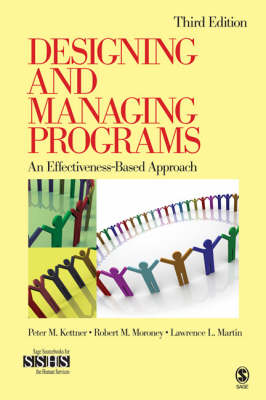
Designing and Managing Programs
SAGE Publications Inc (Verlag)
978-1-4129-5195-1 (ISBN)
- Titel erscheint in neuer Auflage
- Artikel merken
Designing and Managing Programs: An Effectiveness-Based Approach, Third Edition, is an updated version of THE classic book on program management and design. This new edition is written in a deliberate manner that has students following the program planning process in a logical manner. Students will learn to track one phase to the next, resulting in a solid understanding of the issues of internal consistency and planning integrity. The book′s format guides students from problem analysis through evaluation, enabling students to apply these concepts to their own program plans.
Peter M. Kettner was a professor at the Arizona State University School of Social Work. He authored six books, 50 articles, monographs, and book chapters on the topics of purchase-of-service contracting, privatization, macro practice in social work, human services planning, and social work administration. Over his 30 year career in academia he served as a consultant to five different state human service agencies and dozens of local nonprofit agencies on their purchase of service contracting practices and in the design and implementation of effectiveness-based planning systems. Robert M. Moroney is Professor of Social Policy and Planning at the School of Social Work at Arizona State University. He is the author of ten books and over 60 articles and book chapters on various aspects of policy, planning, and program evaluation. He currently serves as a board member of the Rosalyn Carter Institute for Human Development. He does extensive consultation with numerous national, state, and local human service organizations. Lawrence L. Martin is Professor of Public Affairs, Social Work and Public Administration at the University of Central Florida in Orlando. He was previously on the faculty of the Columbia University School of Social Work in New York City where he directed the program in social work administration. He is the author of 20 books and major monographs and over 100 articles and book chapters.
Preface
PART I. ASSESSING CURRENT PRACTICES
1. Contemporary Issues in Social Service Program Planning and Administration
Chapter Overview
The Era of Accountability
The Logic Model
Community Focus
The Issue of Effectiveness
Assessing an Existing Program
What Is Effectiveness-Based Program Planning?
Using Effectiveness Principles to Understand Existing Programs
PART II. PROBLEM ANALYSIS/NEEDS ASSESSMENT
2. The Contribution of Theory to Program Planning
Chapter Overview
The Use of Theory in Program Planning
Theory of Practice
Theory in Practice
Theory of Program Planning
Types of Planning
Theory in Program Planning
3. Understanding Social Problems
Chapter Overview
Addressing Social Problems
Stating Problems as Solutions
The Need for a New Approach
Identifying a Social Condition
Defining Problems
Frameworks for Problem Analysis
4. Needs Assessment: Theoretical Considerations
Chapter Overview
The Concept of Need
Theoretical Understandings of Need
Needs Assessment and the Planning Process
Factors Influencing the Definition of Need
Different Perspectives on Need
Need Categories and the Planning Process
Determining Who Is in Need
Two Major Problems: Reliability and Availability of Data
5. Needs Assessment: Approaches to Measurement
Chapter Overview
Methodologies Used in Measuring Need
Extrapolating From Existing Studies (Normative Need)
Using Resource Inventories (Normative Need)
Using Service Statistics (Expressed Need)
Conducting a Social Survey (Perceived Need)
Holding a Public Forum (Perceived Need)
Selecting the Best Method
Approaches Useful for Locating Concentrations of High-Risk Groups
Concluding Comments on Needs Assessment
PART III: PLANNING, DESIGNING, AND TRACKING THE INTERVENTION
6. Selecting the Appropriate Intervention Strategy
Chapter Overview
The Program Hypothesis
Types of Program Hypotheses
The Process of Developing a Program Hypothesis
Program Hypotheses and the Idea of Consequences
From Program Hypothesis to Service
Incorporating Problem Analysis Into Program Design
7. Setting Goals and Objectives
Chapter Overview
Goals and Objectives: A Framework for Action
From Program Hypothesis to Goals and Objectives
The Function of a Mission Statement
The Formulation of Goals
The Formulation of Objectives
Requirements for All Objectives
Outcome Objectives
Process Objectives and Activities
Integrating Outcome Objectives, Process Objectives, and Activities
8. Designing Effective Programs
Chapter Overview
The Significance of Program Design
Designing the Elements of a System
Defining the Elements of a Program
The Relationship Between Objectives and System Components
Specifying the Program Hypothesis
9. Using Management Information
Chapter Overview
Documentation Practices in Social Services
Designing a Data Collection System for a Program
PART IV: CALCULATING THE COSTS AND VALUE OF THE INTERVENTION
10. Budgeting for Control, Management, and Planning
Chapter Overview
The Differences Between Budgeting and Accounting
The Principal Purposes of Budgeting
Budgeting and the Systems Framework
Models of the Budgetary Process
Major Budgeting Systems
Dealing With Revenue Increases and Decreases
Budgeting in Social Service Agencies Today
11. Line-Item, Functional, and Program Budgeting Systems
Chapter Overview
The Focus of Major Budgeting Systems
Line-Item Budgeting Systems
The Link Between Line-Item Budgeting and Functional and Program Budgeting
Functional Budgeting Systems
Program Budgeting Systems
A Comprehensive Budgeting System
12. Performance Measurement, Monitoring, and Program Evaluation: Data Requirements
Chapter Overview
The Link Between Performance Measurement, Monitoring and Evaluation, and Management Information Systems
Feedback and Self-Evaluating Systems
Performance Measurement
Monitoring
Program Evaluation
Program Data Requirements
Performance Measurement, Monitoring, Program Evaluation, and Program Data
The Utility of Performance Measurement, Monitoring, and Program Evaluation
13. Program Impact Evaluation and Hypothesis Testing
Chapter Overview
Differentiating Program Evaluation From Performance Measurement
Impact Program Evaluation
Impact Program Evaluation and Hypothesis Testing
Research Designs for Impact Program Evaluation
A Concluding Comment
About the Authors
| Erscheint lt. Verlag | 7.1.2008 |
|---|---|
| Reihe/Serie | SAGE Sourcebooks for the Human Services |
| Verlagsort | Thousand Oaks |
| Sprache | englisch |
| Maße | 152 x 228 mm |
| Gewicht | 420 g |
| Themenwelt | Sozialwissenschaften ► Pädagogik ► Sozialpädagogik |
| Sozialwissenschaften ► Soziologie | |
| Wirtschaft ► Betriebswirtschaft / Management ► Unternehmensführung / Management | |
| ISBN-10 | 1-4129-5195-X / 141295195X |
| ISBN-13 | 978-1-4129-5195-1 / 9781412951951 |
| Zustand | Neuware |
| Haben Sie eine Frage zum Produkt? |
aus dem Bereich



